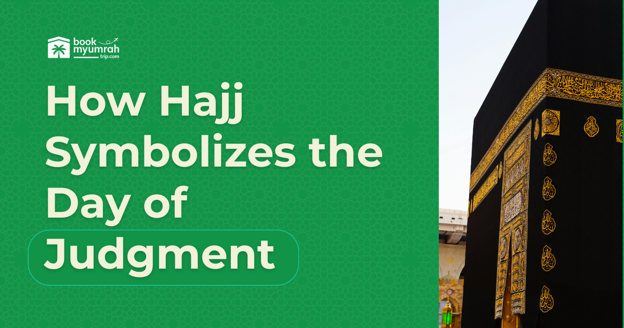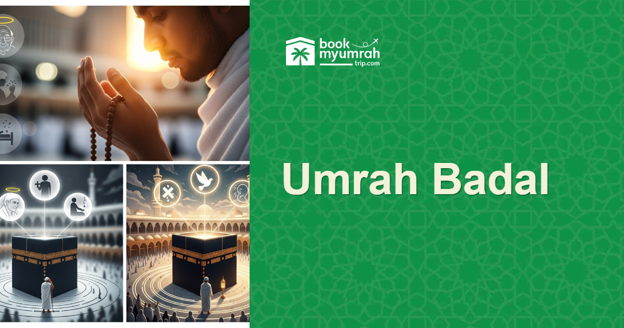How Hajj Symbolizes the Day of Judgment: Educational Insights for Every Muslim

Team BookMyUmrahTrip
Ever wondered if the Day of Judgement and Hajj are interconnected? Well, there’s absolutely a strategic link that helps you get a whole new sense of judgment day when you perform Hajj.
All Muslims around the globe are aware that Hajj is one of the five core pillars in Islam. It’s a compulsory step for each once in their lifetime, given they are financially and physically stable. Then, there is the Day of Judgement (al-Akhirah). It's when Allah (s.w.t.) will raise our souls back to life, question our deeds of Duniya, and deliver the final justice, which apparently all of us await.
When you learn the spiritual meaning and structure of Hajj, you can align them with the parallels in the Day of Judgment all well described in the Quran.
Not only are these educational, but also valuable with regard to Islamic psychology and counseling, allowing you to internalize the sense of responsibility, cope with fear, push yourself towards good character, and hope to receive mercy, among other hidden benefits.
How Hajj Rituals Correspond to the Day of Judgment?
Learning the Hajj significance is the main thing that helps you connect the dots in the Day of Judgement. Here’s how:
1. Oneness & Equality in the Sight of Allah
Millions of Muslim people (whether rich or poor, of any nationality, tongue, color, or culture) stand in the same plain clothes (Ihram) and follow the same rituals in Hajj. Everyone will be resurrected and equally judged on the Day of Judgment, and worldly position will be irrelevant. This practical equality aids in making one stronger in humility and realization that the true value is in piety rather than position.
2. Standing on Arafah (Wuquf)
The 9th day of the Dhul-Hijjah starts as a pilgrim is before Allah (s.w.t.) on the barren lands of Arafat with his hands clasped seeking His mercy. And this usually marks the climax of Hajj. It’s like a preparation to stand on the Judgment Day: without distractions, without the luxuries of the world, and fully subject to the mercy and justice of Allah.
3. Manifestation of Deeds
Each activity of Hajj; Tawaf (circumambulation), running between Safa and Marwah (Saʿi), overnight in Muzdalifah, stoning the devil (Ramy al-Jamarāt) has a symbolic meaning. “Books of deeds” will be opened on the Judgement Day, and all the actions will be revealed. The pilgrim’s journey reveals internal states: intention (niyyah), patience, sacrifice, cooperation, and faith.
Psychological & Spiritual Impact: Preparing for Judgement in This Life
Self-Reflection and Humility
The physical sufferings, the mob, the patience, and the prolonged prayers impel self-examination. We are faced with our sins, fears, and hopes. This is useful in Islamic counseling; it authorizes one to be guilty of an offense, to reflect, and to repent.
Fear and Hope
Hajj is the sense of both:
fear (of accountability, of being unworthy),
hope (mercy, forgiveness)
An example would be the Day of Arafah, which is a place of great mercy. One of the hadiths states: “There is no day when Allah liberates more people from the Fire than the Day of Arafah.” ~Sahih Muslim, 1348
Losing hope without any fear of it is a form of paralysis; having hope without responsibility may result in carelessness. Hajj demonstrates the way they need to strike a balance.
Remorse, Repentance, and Moral Boosting
The knowledge of the possibility to stand before Allah will make you leave sins, reconcile with those you wronged, ask forgiveness from them, and strive to improve. This sort of existential motivation is usually required by the patients during counseling.
Statistical and Real World Data that demonstrates the Scale and Effect of Hajj
Scale of Pilgrimage: There were about 1,833,164 pilgrims for Hajj in 2024. 2025 (1446H) marked the Hajj of 1,673,230 pilgrims, 90% of whom were from around the entire world; each language, each tribe.
Diversity & Equality: The Gender ratio was approximately 52.4% males and 47.6% females of the total external pilgrims, and similar among internal pilgrims. This indicates that participation is broad beyond cross-gender, nationality, and socioeconomic lines.
Psychological/Health Stress: Physical anguish, heat exposure, the potential of disease or death, all of which remind pilgrims of death and human vulnerability, just like the Judgment Day will remind all of their weakness and reliance on Allah.
Hajj Significance for Islamic Psychology and Counseling
Assistance in living with responsibility: The symbolism of Hajj may be applied in the therapeutic/counseling process to encourage moral behavior, decrease moral inactivity. As an example, envisioning one standing before Allah assists in getting rid of bad habits (Imaan imaginary exposure).
Fear of being judged or dying: most find it difficult to cope with the fear of sin, death, and the afterlife. The lessons of Hajj (mercy, forgiveness, hope) are a plus: fear is natural, but combined with hope and plan (repentance, making deeds better).
Resilience of the spirit: Rites, group beliefs, and sacrifice fortify the mind. During group therapy or counseling, remembering the unity of Hajj is used to make the people feel less isolated; they can be less ashamed of their sins because they are a part of a bigger Ummah, and seeking forgiveness.
Therapeutic du'a, Quranic meditation: Promotion of the frequent reading of verses on the Hereafter, reading du'as, taught at Hajj/Arafah, to have a peaceful heart, and to have hope.
Take Away
Hajj is not just a journey, but it is a representation. You can say it's a kind of preview of what will happen to all human beings on the Day of Judgment. Hajj is the hereafter reality, the transformation of one generation into another, the revelation of actions, the weighing of hope and fear.
While you might not be doing Hajj this year, you can keep its lessons with you, live intentionally, ask for mercy, become a better person, and remind yourself of death and responsibility not to depress you, but to make you happier.
FAQs
Do the non-pilgrims witness the figurative lessons of Hajj / Day of Judgment, too?
Yes, absolutely. A lot of the spiritual teachings (equality, accountability, repentance, mercy) can be absorbed by the non-physical audience. Fasting on Arafah, du'a, Dhikr (remembrance), and contemplating the Qur'an concerning the Hereafter- all assist non-pilgrims to be in the spiritual realms.
What is the way such symbolism can be applied in Islamic counseling while being non-traumatizing and non-guilt-inducing?
The key is balance. Focus on the mercy of Allah and responsibility. Be hopeful, penitent, and improve day by day instead of being perfect. Cite examples, rituals as metaphor, e.g., standing in Arafah as clarity, tawaf as circumventing obstacles, etc., recite Qur'an and duas to calm the heart for Allah is Ever-Forgiving, Most Merciful.
What are some practical things that a Muslim can do every day to be ready to face the Day of Judgment, based on Hajj?
Keep intentions pure. Do little acts of worship every day; forgive others and ask forgiveness; go over what one has done many times; spend in charity; keep accountable (journaling good and bad); memorize or read verses about resurrection and judgement; make duas taught in Arafah now and then.


